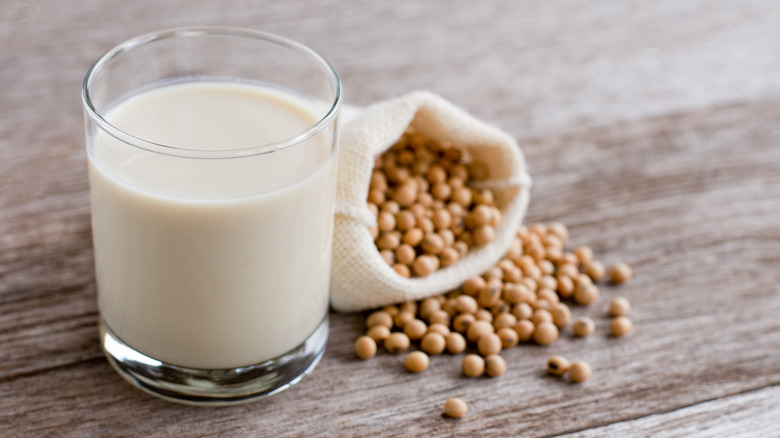How Henry Ford Played An Unlikely Role In The Success Of Soy Milk
These days, it is pretty easy to find soy milk on just about any supermarket's shelves in America. But prior to the 1990s, soy milk was pretty scarce, at least in the U.S. However, America was simply behind the times when it came to soy. Soy has long been a staple of East Asian cuisine — in fact, soy milk first originated in China. According to the Soy Info Center, people would boil the doujiang (the Chinese term for soy milk) and drink it warm, typically sweetening with sugar as a breakfast beverage, or salting it and using it as a dipping sauce for deep-fried crullers.
However, soy milk on its own wasn't considered particularly exciting, even in Asia: Generally, it was considered more of a stopping point between the soybean and its final form, tofu, than an actual commodity by itself (via Serious Eats). That seemed to be the case until the 1920s, when some enterprising Chinese companies realized they could bottle and sell the milk. Even so, it still took some time for it to catch on in the rest of the world. Bottled soy milk reached Japan around 1957, and soy milk didn't really spread to the Western world until the mid-1980s. But the soybean had an interesting history in the U.S., along with one unlikely ally that ultimately helped launch soy milk's present-day success.
Henry Ford funded a soybean research laboratory
It turns out we might have Henry Ford –- yes, Henry Ford of Ford Motor Company fame -– to thank for all those soy milk brands we have to choose from today. The famous industrialist wasn't just into making car production more efficient, he was also interested in the interplay between industry and agriculture, according to the Henry Ford Center. While Ford certainly was far from the first person to grow the soybean crop, in the late 1920s he became intrigued by the idea of using soybeans to improve the automobile industry.
More specifically, he believed that soybeans could be used to make stronger, safer, more sustainable plastics that could in turn be used to make car parts. He also wanted to explore the possibility of extracting soybean oil and using it to make paints, plastics, and other automobile accessories, per the Henry Ford Center. Therefore, in the 1930s, he opened up an experimental soybean research laboratory in Greenfield Village in Dearborn, Michigan to unlock the many potential uses that were hidden inside the soybean. By 1933, he had found a way to produce paints and parts like gear shift knobs for his automobiles from soybean oil and ground soybean meal. However, Ford wasn't only interested in soybeans as a source of plastic: He also believed there were great benefits to consuming the legume.
Henry Ford believed soy milk was a superior substitute to cow's milk
Henry Ford also believed that soybeans could be the answer to improved health and more efficient agriculture, according to the Press Herald. Ford, a vegetarian, disliked using cattle for dairy production, calling cows "the crudest machine in the world" for producing milk. Instead, he believed it was "a simple matter to take the same cereals that the cows eat and make them into a milk which is superior to the natural article and much cleaner," according to one biography (via Serious Eats). Thanks to the businessman's interest in unlocking the soybean's many practical uses, soy milk received a significant boost in funding, study, and promotion in the United States throughout the 1930s that it likely otherwise might not have had.
However, despite having one rich and powerful backer in its corner, soy milk still didn't really catch on in the U.S. until the 1990s, when it began to be advertised as a healthier, dairy-free substitute to regular old cow's milk. A more health-conscious public was enticed by soy milk's potential benefits of lowering bad cholesterol and improving heart health, according to Switch 4 Good. These days soy milk has, to put it mildly, caught on — and it is far from the only milk substitute on the market. Today, there are an ever-increasing number of plant-based, dairy-free milk for consumers to choose from at their local grocery stores.


